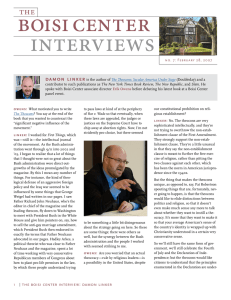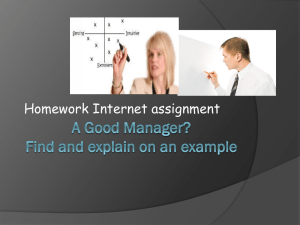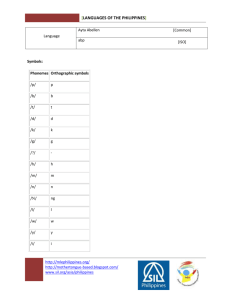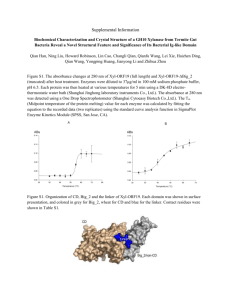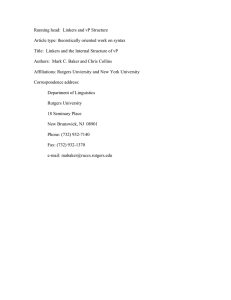Document 11102891
advertisement
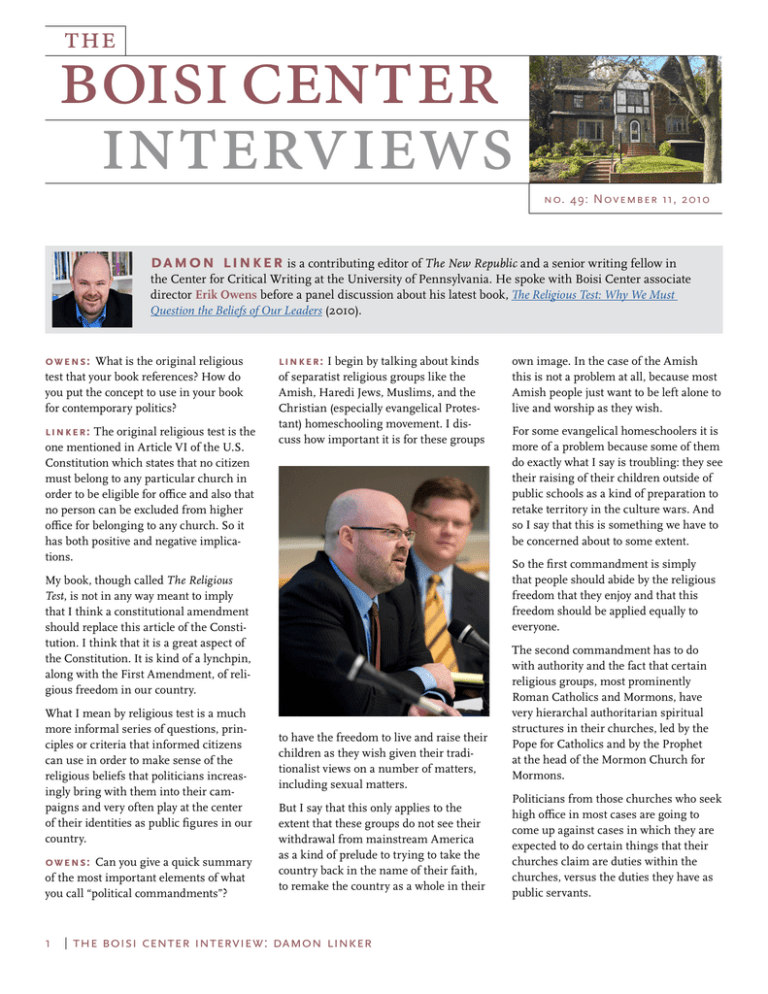
the boisi center interviews no. 49: November 11, 2010 damon linker is a contributing editor of The New Republic and a senior writing fellow in the Center for Critical Writing at the University of Pennsylvania. He spoke with Boisi Center associate director Erik Owens before a panel discussion about his latest book, The Religious Test: Why We Must Question the Beliefs of Our Leaders (2010). owens: What is the original religious test that your book references? How do you put the concept to use in your book for contemporary politics? linker: The original religious test is the one mentioned in Article VI of the U.S. Constitution which states that no citizen must belong to any particular church in order to be eligible for office and also that no person can be excluded from higher office for belonging to any church. So it has both positive and negative implications. linker: I begin by talking about kinds of separatist religious groups like the Amish, Haredi Jews, Muslims, and the Christian (especially evangelical Protestant) homeschooling movement. I discuss how important it is for these groups owens: Can you give a quick summary of the most important elements of what you call “political commandments”? 1 For some evangelical homeschoolers it is more of a problem because some of them do exactly what I say is troubling: they see their raising of their children outside of public schools as a kind of preparation to retake territory in the culture wars. And so I say that this is something we have to be concerned about to some extent. So the first commandment is simply that people should abide by the religious freedom that they enjoy and that this freedom should be applied equally to everyone. My book, though called The Religious Test, is not in any way meant to imply that I think a constitutional amendment should replace this article of the Constitution. I think that it is a great aspect of the Constitution. It is kind of a lynchpin, along with the First Amendment, of religious freedom in our country. What I mean by religious test is a much more informal series of questions, principles or criteria that informed citizens can use in order to make sense of the religious beliefs that politicians increasingly bring with them into their campaigns and very often play at the center of their identities as public figures in our country. own image. In the case of the Amish this is not a problem at all, because most Amish people just want to be left alone to live and worship as they wish. to have the freedom to live and raise their children as they wish given their traditionalist views on a number of matters, including sexual matters. But I say that this only applies to the extent that these groups do not see their withdrawal from mainstream America as a kind of prelude to trying to take the country back in the name of their faith, to remake the country as a whole in their the boisi center interview: damon linker The second commandment has to do with authority and the fact that certain religious groups, most prominently Roman Catholics and Mormons, have very hierarchal authoritarian spiritual structures in their churches, led by the Pope for Catholics and by the Prophet at the head of the Mormon Church for Mormons. Politicians from those churches who seek high office in most cases are going to come up against cases in which they are expected to do certain things that their churches claim are duties within the churches, versus the duties they have as public servants. That chapter and that commandment seek to say that if you want to be an upstanding devout Catholic or Mormon, by all means do. But if you want to serve the nation in high office, especially at the highest office, the office of the President, you should clearly state that you intend to place the Constitution above your religious duties, if they come into conflict. That is exactly what John F. Kennedy said 50 years ago when he encountered questions like this while he was running for office. ity and scripture as the ultimate arbiter of truth. The problem is that science often questions those common sense starting points and, after subjecting them to rigorous data analysis and experiments, often shows that they are not actually founded in truth. Some evangelical Protestants have become accustomed to saying that if science conflicts with their religious convictions about the Bible or morality, then what we call science must not be real science. Real owens: So you are endorsing Kennedy’s position as a model for today. Is that right? linker: Yes, I am. I think that that was a very good model for members of religious groups at least those who are in those more authoritarian religious traditions. And I do not mean that as a criticism, that they are more authoritarian. That is one way to organize a church, or a religious group. It is just that if you want to serve the nation at the highest levels you cannot necessarily follow the edicts given down by the head of your church while serving in that high office. Kennedy did a very good job of saying that no American need worry about such a thing, because if there were a conflict he would side with the Constitution. The third commandment has to do with having a respect for worldly knowledge and science, in other words, giving science its place or its due. This mainly applies once again to evangelical Protestants, many of whom have developed an outlook on science and religious truth that has been unduly influenced by American egalitarianism. American egalitarianism is the American belief in the equality of human beings and the common sense status of our political beliefs and rights. What you end up with, going all the way back to America’s founding period, is a form of Protestant worship that looks to average, everyday intuitions about moral- 2 “If you want to ser ve the nation in high of f ice... you should clearly state that you intend to place the Constitution above your religious duties, if they ever come into conf lic t .” science is what they believe, namely that the earth is 6,000 years old, or something like this. I see this as a problem because such claims are not reliable and not an acceptable way of trying to make sense of the world we live in. I think evangelical Protestants should follow the advice and lead of Mark Noll, an evangelical historian who has been quite critical of evangelicals along these lines. Evangelicals, I would say, have to learn to live with the tensions of being a modern believer, which is to realize that science has a lot of the boisi center interview: damon linker truth to it, and if that makes it difficult to believe in biblical inerrancy, then that is a tension at the heart of being a modern believer. And there is no easy way of getting around that tension. owens: This raises a question for me about the extent to which the test is applicable or influential in American politics. You write that it is crucial to distinguish between what you call “politically toxic” and “politically benign” forms of religion, as espoused by people who seek office to represent us and act on our behalf. linker: Right. owens: Do you think this way of thinking about political leaders would affect our understanding of one another in society? If this is what we hold our leaders to, wouldn’t this influence how we understand one another, and thus create a challenge for the pluralistic tolerance that you are advocating in the first place? linker: That is a very good question. I will admit that there is a kind of slipperiness in the book, not only by implication, as you seem to be saying, but actually in the arguments. Some chapters are much more focused on what we should be concerned about when it comes to leaders in the country holding high office. Other chapters, though, do touch on the kind of common beliefs held by citizens who are not holding any high office. For instance, in the chapter on American providence, I am quite critical of average, everyday believers who are a little too quick to think that they can look out at America’s actions in the world and the unfolding of world history and read God’s intentions. I think it is dangerous when millions of Americans begin to make judgments about America’s actions in the world because of a belief, say, in the case of a lot of evangelicals and Pentecostals, that Christ’s return is imminent in the Middle East and somehow wrapped up with American policy in the region. Or, in the case of Mormons, that when Christ returns, he will rule the world from the territory of the United States. In those cases, I would not say that our argument is that we should not tolerate people believing these things, but that we should try to insist that people be intelligent believers and thinkers. For instance, I rely in that chapter a lot on Augustine’s argument that it is perfectly legitimate to believe that God operates in the world and has a role in guiding the rise, fall and movement of nations throughout history, while also admitting that we cannot, from our position in history and our fallen state, know decisively the nature of God’s role. owens: Are you then tethering that particular Augustinian notion to liberalism? linker: Well, I am applying it to citizens within liberal democracies who might be inclined to get a little sloppy in jumping to conclusions. To those who baptize America as God’s conduit for acting in world history, simply because of the fact that in this moment in history, America is on top. I do not think it is good theology, let alone good political philosophy, to conclude that we can know what God means to be doing in human history on the basis of the fact that for the last few decades America has been the most powerful nation on earth. We were not 150 years ago, and we might not be 150 years from now, or even sooner. I think that the proper lesson for all citizens, Christian or not, is humility on that issue. owens: This raises a question for me as a social ethicist, or someone also interested in, like you, religion in politics. It seems to me that all prophetic forms or expressions of religion are a challenge to liberal democracy in the sense that they set transcendent benchmarks or reframe priorities away from the satisfaction and security of the sovereign state. How do you respond to that? Do you agree with that? 3 linker: I agree to an extent. In a free society—I understand liberalism as a form of government—I think that it is perfectly fine that a lot of citizens believe in transcendent truths and a kind of spiritual grounding and moral principles. In my view it only really becomes a problem in the kind of areas that I talk about in the book. And exactly where those areas are will also evolve and change over time as theologies and common beliefs change. For instance, again, I talked about the chapter on human knowledge and giving it its due. Those who have studied the history of these things realize that it really was only about 120 years ago that anyone even began to argue that we could read the Bible scientifically, by using the lengths of ages of the prophets to discover that the earth is approximately 6,000 years old. Prior to that, no one would have even thought you could read the Bible in such a crudely literalistic way. So 200 years ago, my chapter about human knowledge would not have needed to be written. I would say there are certain cases where transcendent beliefs can be a challenge and a problem for liberalism. But it is selective, and exactly which ones are a problem rise and fall as both politics and religious beliefs evolve. owens: One last question. The religious test that we began talking about—the prohibited religious test in the boisi center interview: damon linker the U.S. Constitution that you articulately endorsed as a good thing—is one of the protectors of our religious freedom. What would you say to the charge that the religious test that you are suggesting actually violates the spirit of the original by reducing the range of religious liberty in our country? Is that a fair charge? linker: I do not think it is, because as I said I support Article VI as written, and its spirit. I think it is perfectly legitimate for citizens, either as individuals or as members of the so-called Fourth Estate, mainly journalists and so forth, to raise questions about anything that a potential public servant brings with him into a campaign. I think that it is appropriate to raise questions and have a conversation that doesn’t rise to the level of constitutionality. One way of exercising our free speech rights is by asking our would-be leaders tough-minded questions about what they think and why. Article VI is meant to avoid excluding people on the basis of belonging to certain groups and there is certainly no religious group in my book who I think even informally should be excluded. I think any member of any group can be liberal in the sense that I define it, which is willing to do what it is best for the country regardless of what they believe is right and true about God. [end] The Boisi Center for Religion and American Public Life Boston College 2 4 Quinc y Road Chestnut Hill, MA 02 467 tel 617 - 55 2-1860 f a x 617 - 55 2-1863 publife@b c .e du Visit bc .e du/boisi-resources for a complete set of the Boisi Center Inter views and audio, video, photographs, and transcripts from our events. 4 the boisi center interview: damon linker b oisicenter @b oisi _ center

